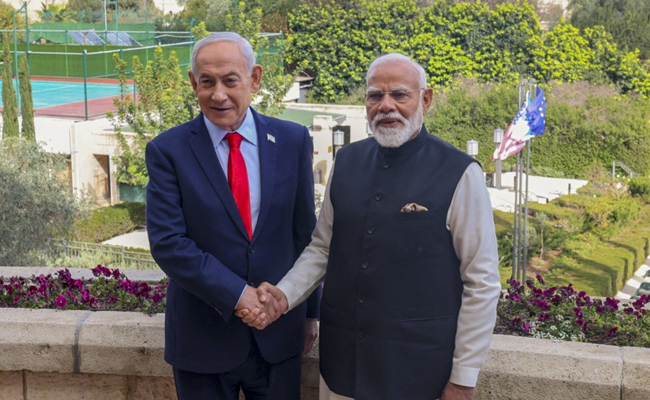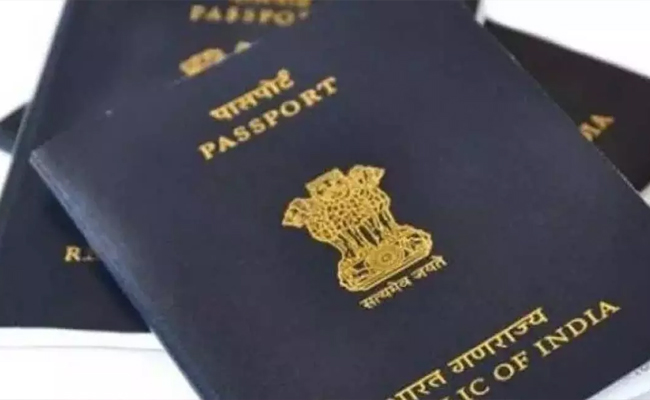Mumbai, Mar 17: Mohammad Shami and Mohammed Siraj shared three wickets apiece as India bowled out hapless Australia for a mere 188 in 35.4 overs in the first ODI of their three-match series, here on Friday.
The collapse was an inexplicable one as Australia lost last six wickets for only 19 runs in a space of 7.5 overs as Hardik Pandya's decision to bring in Shami for a quick second spell turned out to be decisive.
The delivery to Cameron Green that sent the off-stump cart-wheeling was a real peach. It pitched on line of off-stump and Green had to commit but there was shade late movement that beat the batter and knocked back the off-stump.
The veteran pacer helped India pull things back in control after an attacking 65-ball 81 from Mitchell Marsh set Australia on the course of a competitive total, as his second spell of 3-2-8-3 broke the back of Australia's resistance after a sparkling start.
Shami finished with brilliant figures of 6-2-17-3.
On the other hand, Siraj, who provided an early wicket in the second over, also enjoyed success in his second spell to return with 5.4-1-29-3, snaffling the last two wickets in the Australian innings.
Marsh provided Australia with a rollicking start, cracking 10 fours and five sixes in his first-ever innings as an opener in ODIs, on his comeback to international cricket after a three-month layoff following an ankle surgery.
Marsh's charge in the first half of the game ensured Australia kept moving briskly towards a big total, but India kept making inroads at regular intervals and eventually bundled them out for a below-par score.
After Travis Head played one onto his wickets off Siraj in the second over, Marsh joined forces with Australia captain Steve Smith for a sturdy 72-run stand for the second wicket.
Smith, yet to record a half-century on the tour, chased one outside off from Hardik Pandya to walk back for a 30-ball 22.
Marsh continued with his attack but as he was nearing his second ODI century against India and first since January 2016, he played one shot too many to be dismissed by Ravindra Jadeja.
The Indian spinner bowled a delivery wide on the off-stump, and Marsh mis-hit it to be caught at short third man.
Jadeja then produced a stunning one-handed catch to get rid of Marnus Labuschagne (15) off Kuldeep Yadav, and Josh Inglis chopped one onto his wickets off Mohammad Shami as Australia stuttered to 169/5 in the 28th over.
Shami produced a wicket-maiden 30th over in which Shubman Gill dropped a catch at first slip his second in the innings as Green's off-stump went flying after a 19-ball 12.
But Gill finally held on to a regulation catch off Shami in the 32nd over to end Marcus Stoinis' (5) innings, sparking a batting collapse for the visitors who slipped from 129/2 to 188 all-out, losing eight wickets for 59 runs.
Glenn Maxwell (8) also flopped with the bat, hitting one straight to Pandya at short midwicket off Jadeja in the 33rd over.
Gill improvised further when he put in a dive to his right to help Siraj record his second wicket, with Sean Abbott (0) also failing to make a mark. The right-arm bowler had Adam Zampa (0) caught behind for the final wicket of the innings.
While the Indian pace duo of Shami and Siraj were spot-on, Australia rather found batting easy against the spin pair of Kuldeep and Jadeja, as they gave away 94 runs from a collective 17 overs with three wickets.
Let the Truth be known. If you read VB and like VB, please be a VB Supporter and Help us deliver the Truth to one and all.
Jerusalem (PTI): India and Israel on Thursday elevated their "time-tested" relationship to a special strategic partnership and agreed to soon firm up a "mutually beneficial" free trade deal even as Prime Minister Narendra Modi strongly backed the Gaza peace initiative, asserting that humanity must never become a victim of conflict.
Following talks between Modi and his Israeli counterpart Benjamin Netanyahu, the two sides inked a plethora of agreements to expand cooperation in areas of trade, agriculture, energy, cyberspace and digital payment.
India and Israel also vowed to expand their already close defence partnership by working towards joint development and joint production of military hardware under the framework of the transfer of technologies.
In his media statement, Modi said India's security interest is linked to peace and stability in the Middle East, adding that New Delhi fully supports the Gaza Peace Initiative.
"India's stance is clear: humanity must never become a victim of conflict. A path to peace has been created through the Gaza Peace Plan. India has fully supported these efforts," he said.
"In the future as well, we will continue dialogue and cooperation with all countries," he said.
PM Modi landed in Israel on Wednesday on a two-day visit. It is his second visit to Israel in nine years.
In his remarks, the prime minister said India and Israel have a united view that there is no place for terrorism in the world and both sides stand shoulder-to-shoulder in countering terrorism and its supporters.
"Our relationship is founded on the strong bedrock of deep trust, shared democratic values, and human sensitivities. Our bond has stood the test of every trial of time," he said.
"Today, we have taken the historic decision to elevate our time-tested partnership to the status of a 'Special Strategic Partnership'," he said.
The prime minister also announced the establishment of an India-Israel critical and emerging technologies partnership to impart a new momentum for cooperation in areas of artificial intelligence, quantum, and critical minerals. "I am pleased that an agreement has been reached for the use of UPI in Israel," he said.
The prime minister, referring to the threat of terrorism, said India and Israel will continue to confront the menace unitedly.
"India and Israel are completely clear that there is no place for terrorism in the world. In any form, in any expression, terrorism cannot be accepted," he said.
"We have stood shoulder-to-shoulder in opposing terrorism and its supporters, and we will continue to do so," he added.
India and Israel also discussed the implementation of the India-Middle East Europe Economic Corridor (IMEC) and cooperation under the framework of I2U2 (India-Israel-UAE-USA).





